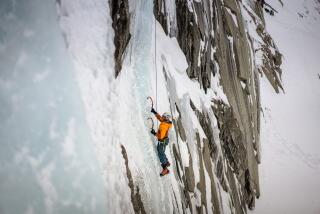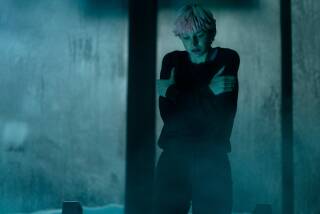It’s an Ice Place to Get Married
- Share via
JUKKASJARVI, Sweden — When Jane Blake said, “I do,” it wasn’t clear whether her voice trembled from emotion or the piercing cold.
Her velvet cloak could only partly shield her from the Arctic conditions enveloping the wedding ceremony.
The groom, Miles Wakefield, looked slightly more comfortable in his tailor-made suit with extra-thick lining. But his lips were turning purple toward the end of the half-hour rite.
“Tonight we spend our wedding night at a suite in the Ice Hotel,” the 32-year-old engineer said as he stepped out of the igloo-like church with his bride.
“Chilly, chilly,” Blake added, giggling with excitement under a sparkling tiara.
The couple traveled from Essex in England to this small Swedish town, 124 miles north of the Arctic Circle, just so they could exchange vows in a 21-degree chill.
Three other British couples waited to walk down the aisle of the Ice Church, a frosty chapel adjoining the famous Ice Hotel of Jukkasjarvi.
At least four other chapels have been built at snow and ice hotels in Finland, Canada and Alaska in what has become an exotic alternative to tropical wedding getaways.
“In England, the Caribbean is so mid-’90s now,” Wakefield said. “Las Vegas -- the celebrities have killed that, because they’ve done it. We wanted something that was fairly unique.”
Every winter, the church is rebuilt, along with the hotel, from ice blocks carved out of the nearby Torne River. The first church in 1992 was only a small chapel, but rising demand for icy weddings has led to repeated expansions.
This year’s church is about 15 yards long and seats 40 people. It occupies a prominent spot next to the main entrance of the ice-and-snow complex, which since last winter also includes a replica of Shakespeare’s Globe Theater.
Although most visitors are Britons and Swedes, many of them local residents, the Ice Church has attracted couples from as far away as the United States, Japan and New Zealand.
They come to be married by vicar Jan-Erik Kuokso, who preaches in Swedish and sings in Sami, the language of the indigenous reindeer-herding people of northern Scandinavia. An assistant translates the vital parts of the ceremony.
“We take about three, four couples a day,” said the complex’s wedding coordinator, Eva Lundquist. “We don’t want to take any more than that. We don’t want it to become a factory, or some kind of Las Vegas thing.”
Organizers stress that the Ice Church is no playground. You won’t see anyone in an Elvis costume or flashing lights.
Although the hotel next door is lavishly decorated with ice crystal chandeliers and frozen sculptures, the chapel is as simple and austere as the winter landscape that gives it life.
A single row of candles illuminates the barrel-roofed chapel, suffusing the ice blocks with hues of crimson. The pews, made of snow, are covered with reindeer skins, which fill the sanctuary with a pungent scent of wilderness.
The ambience shifts to good fun only paces away at the hotel’s ice bar, where Swedish vodka is served in frozen shot glasses. The wedding night is usually spent cuddling up in a two-person sleeping bag in one of the hotel’s ice suites.
“Six below zero is probably not the best situation to be in for a bit of passion, but we did want a different wedding so everything about it was different,” the new Mrs. Wakefield said.
The Ice Church hosts 150 weddings a year.
The first is held on Dec. 26 and the last will take place in early April, before the sun becomes strong enough to melt the entire complex.
“Some people book a year and a half in advance, especially if they have large parties,” Lundquist said.
A wedding costs about $860. Those who stay in Jukkasjarvi for the honeymoon can explore the fantastic surroundings by cross-country skis, snowmobile or dogsled.
The hotel also offers excursions to view the aurora borealis, nature’s own light show that is best viewed near the poles. There are also ice-sculpting classes and visits to reindeer-herding Sami.
Kuokso, who heads the local Lutheran parish, also performs 25 baptisms each winter in the Ice Church. He carries the holy water in a thermos to prevent it from freezing and quickly splashes it on the baby’s forehead after pouring it into a wooden christening font.
The Ice Church doesn’t perform funerals because it’s supposed to be a place of happiness.
A mild-mannered man with thinning gray hair, Kuokso says the Ice Church is no different than the wooden church where he usually conducts services -- with one exception: “It’s difficult to give people a warm welcome.”
More to Read
Sign up for The Wild
We’ll help you find the best places to hike, bike and run, as well as the perfect silent spots for meditation and yoga.
You may occasionally receive promotional content from the Los Angeles Times.






